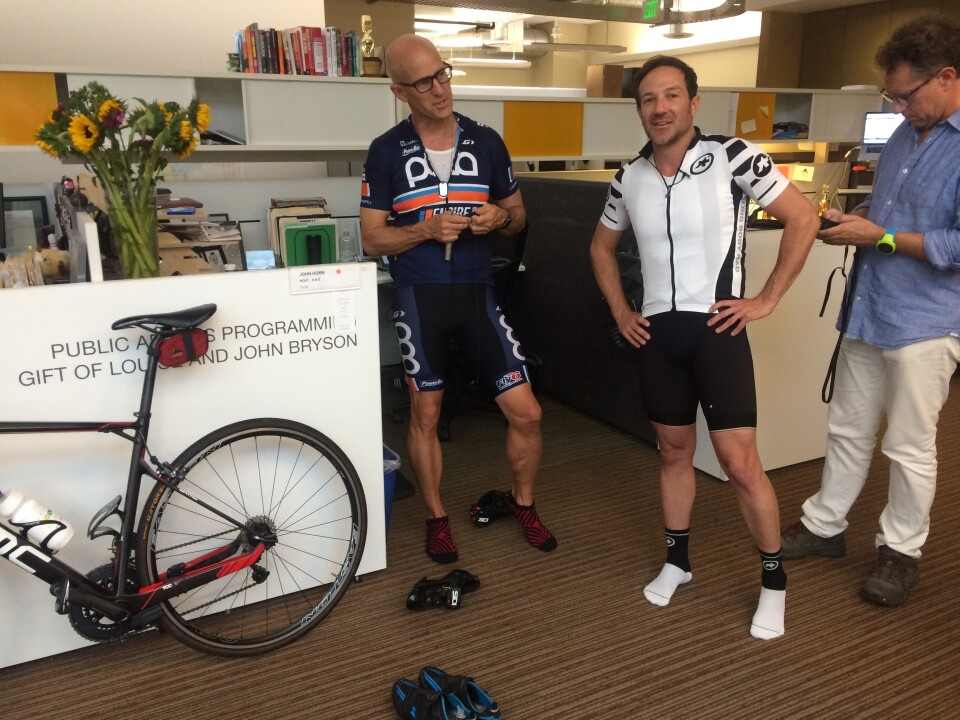"SpongeBob SquarePants" is now a Broadway musical. Playwright Kyle Jarron reveals how the beloved Nickelodeon cartoon was adapted for the stage; Russia's banishment from the 2018 Olympics is connected to Bryan Fogel's documentary "Icarus" about trying to dope his way through bicycle races.
Director Bryan Fogel spins into the Olympic doping scandal with 'Icarus'
When Bryan Fogel was formulating the idea for the documentary, "Icarus," Lance Armstrong had just confessed to using performance-enhancing drugs and was stripped of his seven Tour de France wins.
But Fogel wanted to know if there was a deeper issue in the scandal.
"Every scientist in the world who's in the field of anti-doping are telling me that the system doesn't work," says Fogel, referring to the procedures for catching athletes who use drugs to cheat.
Fogel points out that Lance Armstrong never actually failed a drug test, somehow managing to get through the system more than 500 times.
"Is it Lance's fault or the system's fault?" Fogel asks. "Forget about cycling, everybody on planet earth cares about sports. Sports and the Olympics are being presented as clean. Lance Armstrong getting caught is being presented to the world as a major triumph in anti-doping, yet the only way they're able to get him is through a criminal investigation where his own teammates who did the same thing as him — and didn't get caught — rat him out in exchange for their own immunity."
Fogel is a competitive cyclist and in "Icarus" he used performance-enhancing drugs as an experiment to test the system. He wanted to see if doping could make him a better racer and whether or not he could compete in an unbelievably difficult race in Europe — the Haute Route — as a juiced athlete without failing a drug test.
Fogel enlisted Dr. Grigory Rodchenkov, an anti-doping expert from Russia, to help him — only to find out that Rodchenkov was the mastermind behind a state-sanctioned doping program.

Fogel spoke with The Frame's John Horn about the film and what he learned. Appropriately enough, their talk took place during a bike ride on the streets of Pasadena.
INTERVIEW HIGHLIGHTS:
On the pitch for the movie:
The pitch was, Hey, I'm going to do "Super Size Me" in the world of sports, investigating the anti-doping system at the same time, seeing exactly what these drugs do or not do, whether or not they're safe or harmful. And I'm going to be flying down mountains going 70 miles an hour.
On meeting Dr. Grigory Rodchenkov:
He was running the third largest anti-doping laboratory in the world, which was the Moscow WADA (World Anti-Doping Agency) accredited lab. And he was overseeing the testing of all Russian athletes across all sports. He had also just overseen the testing of the Sochi Olympics. He was also overseeing the testing of all international competitions that were being held in Russia.
On Rodchenkov's involvement in the Russian doping scandal:
He was overseeing a state-sponsored program being funded by the Russian Ministry to essentially see that every Russian athlete across all sports would be able to dope and avoid detection. This system, according to him, had been in place since 1968. So it calls into question the entire history of sport and the history of the Olympic Games. He had been running the laboratory since 2005. And developed the system for Beijing, and for London.
On taking performance-enhancing drugs for the movie:
At the time, I finish the second Haute Route. I had done better, you know statistically as far as my performance, my power. But I didn't win the race. And I finished 27th out of 600 instead of 14. And so I had this "Oh s**t" moment -- my movie's ruined.
On how the film subject matter changed over the course of filming:
In the two years leading up to this, where I was the subject, [Rodchenkov] was my adviser, he was my confidante, and he had been helping me make this movie that he really shouldn't have. And during this time we really developed a true friendship ... This was way beyond a documentary exploring something. All of a sudden he's in jeopardy of his life and we literally [reverse roles]. I become his protector and his adviser. And he becomes the subject. But at that moment, I wasn't thinking about the film.
To hear the full interview with Bryan Fogel, click on the player above.
'SpongeBob' confronts the apocalypse — with a little help from Aerosmith
The Walt Disney Company has made a ton of money — hundreds of millions of dollars every year, in fact — by turning its animated movies into splashy Broadway musicals.
"The Lion King" is still going strong 20 years after it opened, and a much-anticipated staged version of "Frozen" will arrive on Broadway next year.
And the folks at Viacom, who own the cable channel Nickelodeon, among other outlets, have taken notice. Now the media giant has turned one of its most-recognized and beloved series into a Broadway musical, too:
“SpongeBob SquarePants: The Broadway Musical” is now playing on Broadway. It took more than eight years to put the show together, but all the effort seems to have paid off. The reviews have been very positive, and when The Frame host John Horn saw the show last week, even Ben Platt, the Tony-winning star of “Dear Evan Hansen,” was in the audience.
Kyle Jarrow wrote the book for the musical. His credits include “A Very Merry Unauthorized Children’s Scientology Pageant” and the TV series “Valor.”
"SpongeBob is this naive character," Jarrow says. "That's where a lot of the comedy comes from and I think that's also why he is so incredibly lovable. He always sees the bright side ... So, basically, what we decided to do is take 'SpongeBob' to its most absurd extreme, which is: What is the most absurd situation to be optimistic in? It's the apocalypse. So, our show, we like to sort of think of it as 'Armageddon' meets 'SpongeBob' meets 'Our Town.'"
Jarrow and director Tina Landau enlisted the help of an impressive array of notable bands and artists to come up with the musical's original songs — they include Cyndi Lauper ("Hero is My Middle Name"), Sara Bareilles ("Poor Pirates"), Steven Tyler and Joe Perry of Aerosmith ("Bikini Bottom Boogie"), John Legend ("[I Guess I] Miss You"), They Might Be Giants ("I'm Not a Loser"). David Bowie and Brian Eno offered a song from Bowie's catalog ("No Control").
Kyle Jarrow spoke with The Frame's John Horn about getting all those artists on board and the challenge of translating a beloved, quirky cartoon for the stage.
To hear the full interview, click the blue play button above.




